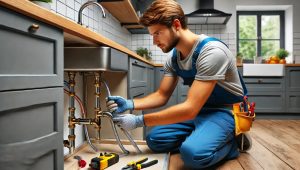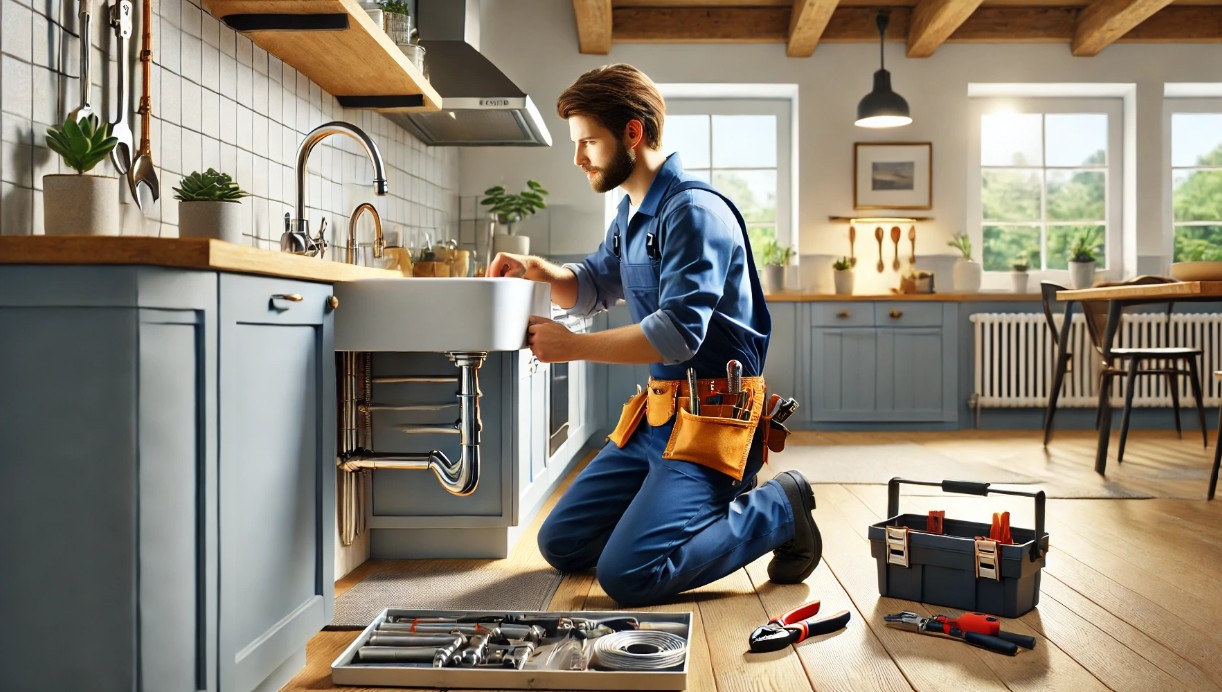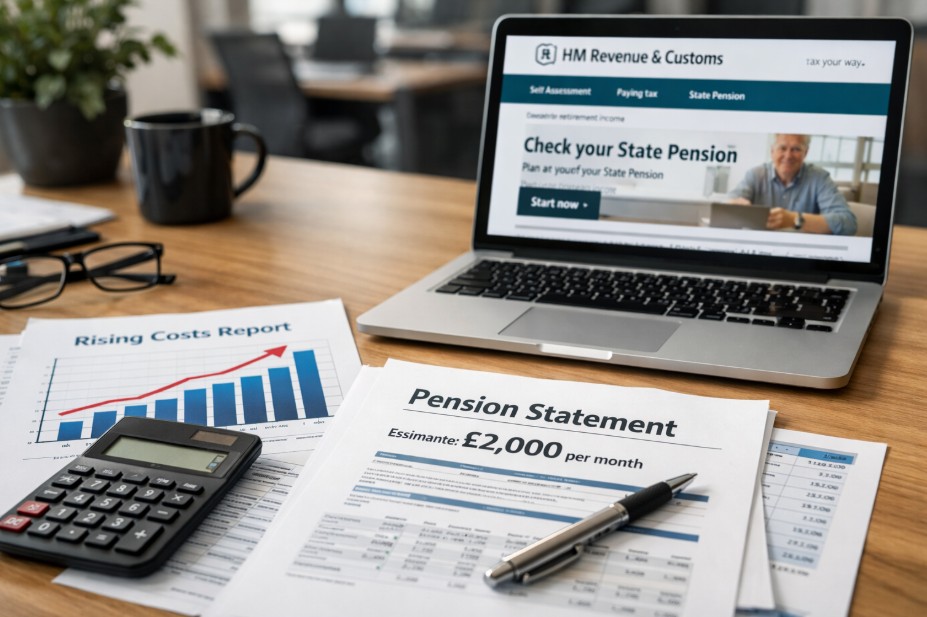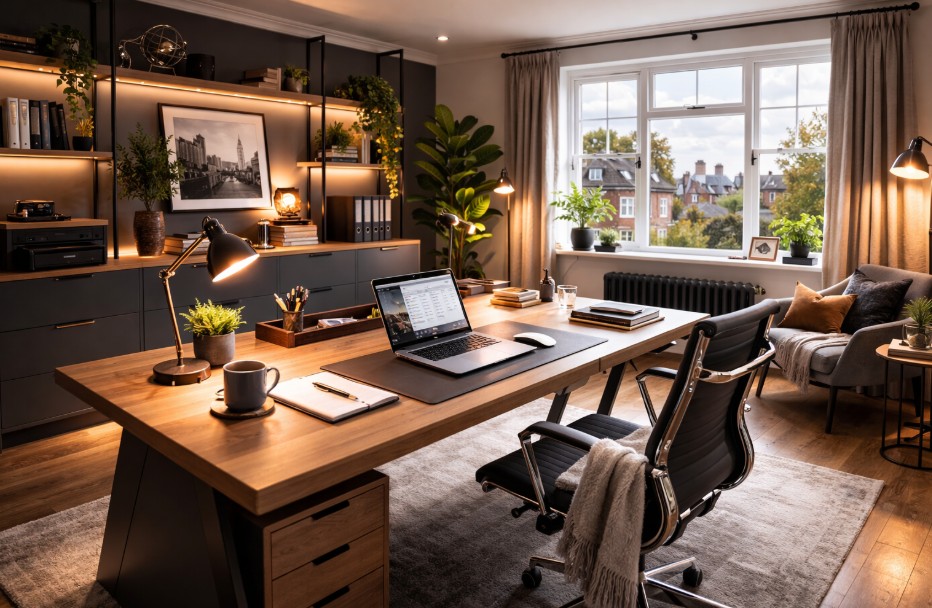Table of Contents
ToggleUnderstanding plumber rates is essential for both customers and professionals in the UK. With the rise of self-employment in the plumbing industry, pricing has become a critical factor in maintaining competitiveness and ensuring quality service. On average, plumber hourly rates in the UK vary significantly based on experience, location, and job complexity.
This article explores the factors influencing self-employed plumber rates, regional differences, and tips for setting competitive pricing.
What Is the Average Hourly Rate for Self-Employed Plumbers?

Self-employed plumbers have the flexibility to set their rates, unlike employed plumbers who receive fixed salaries. On average, self-employed plumbers charge between £20 and £50 per hour. This range depends on the plumber’s expertise, the complexity of the job, and the specific location in the UK.
While self-employment offers greater earning potential, it also comes with challenges such as managing expenses, marketing, and competing in the local market.
The average hourly rate for self-employed plumbers in the UK can be summarised as follows:
| Region | Average Hourly Rate (£) |
| London | £40–£70 |
| Birmingham | £30–£50 |
| Rural Areas | £20–£40 |
| Scotland | £25–£45 |
Plumbers in metropolitan areas like London tend to charge higher rates due to increased demand and higher living costs. In contrast, rates in rural areas are typically more affordable.
What Factors Influence Plumber Rates in the UK?
Several key factors determine the rates plumbers charge in the UK:
- Experience and Qualifications
Plumbers with more years of experience or advanced qualifications, such as Gas Safe registration for working with boilers, tend to charge higher rates. Their expertise ensures high-quality work, making their services more in demand. - Type of Plumbing Work
- Routine Maintenance: Simple repairs, such as fixing a tap, usually have lower rates.
- Emergency Repairs: Urgent jobs often include premium pricing, reflecting the plumber’s availability.
- Installations: Larger projects like bathroom fittings or boiler installations are typically priced as a full job.
- Cost of Materials and Overheads
Plumbers include the costs of materials and operational expenses such as fuel, tools, and insurance in their rates. Self-employed plumbers must also account for expenses like bookkeeping software or marketing. - Market Competition
In areas with a high density of plumbers, competition often drives rates lower. Conversely, in regions with fewer plumbers, customers may pay higher rates. - Seasonal Demand
During winter, demand for plumbers surges due to heating and pipe issues, often leading to increased rates.
How Do Regional Differences Affect Plumbing Rates in the UK?

The cost of plumbing services varies significantly across regions due to living costs, demand, and competition. Here’s an analysis of how location impacts rates:
| Region | Hourly Rate (£) | Call-Out Fee (£) | Emergency Rates (£) |
| London | 40–70 | 60–120 | 150–250 |
| Birmingham | 30–50 | 50–100 | 125–200 |
| Rural Areas | 20–40 | 40–80 | 100–180 |
| Scotland/Wales | 25–45 | 50–90 | 110–200 |
- Urban Areas: Higher rates are driven by higher living costs and greater demand. For instance, plumbers in London can charge 20–30% more than those in rural areas.
- Rural Areas: Lower costs of living and reduced competition generally mean lower rates.
- Seasonal Variability: Certain regions, especially colder ones, may see seasonal spikes in rates during winter months.
What Are the Additional Costs When Hiring a Plumber?
When hiring a plumber, customers should anticipate costs beyond the standard hourly rate:
- Call-Out Charges
Most plumbers charge a flat call-out fee for initial visits, especially for emergencies. This covers their time and travel costs. Average call-out fees range from £50–£100 for standard work and can go up to £120 for emergencies. - Hourly Rates
After the call-out fee, plumbers typically charge an hourly rate for the duration of the work.- Standard Rate: £40–£70/hour.
- Emergency Rate: £100–£250/hour.
- Material Costs
Depending on the job, additional charges for materials such as pipes, fittings, and replacement parts will apply. Some plumbers charge customers at cost price, while others may include a markup. - Out-of-Hours Fees
Weekend, holiday, and evening work typically incurs an additional 25–50% surcharge. - Job-Specific Costs
- For installations, plumbers may offer a quote that includes labour and materials.
- Repairs requiring specialist tools or equipment may also add to the cost.
How Does the Role of the Plumber Affect Pricing?
Plumbing Installers
Most plumbers primarily work as installers, handling large jobs that last all day or several days. This allows them to maximise their chargeable hours while minimising travel and administrative time. For example, a plumbing installer charging £50 per hour can achieve a £350 day rate by working seven chargeable hours, leaving two hours for travel and admin.

According to Checkatrade, the £50 per hour average rate applies mainly to this category, as most installers price their work “by the job” rather than by the hour. Installers typically fall at the lower end of the pricing spectrum for plumbers.
Emergency Plumbers
Emergency plumbers often perform short, urgent jobs and may handle only one or two tasks per day. To meet a £350 daily target, they need to charge around £175 per hour. Emergency plumbers typically charge a call-out fee (averaging £110) plus an hourly rate (£112.50).
For example:
- A 30-minute emergency callout costs £166.25 (including the callout fee).
- A one-hour emergency callout costs £222.50, excluding parts.
While their hourly rate is high, it reflects the 24/7 availability required to provide immediate service, not necessarily the skill level.
Maintenance Plumbers
Maintenance plumbers handle smaller, non-emergency repairs and generally perform four jobs daily. With an average day rate of £350, they typically charge £75 for the first hour and £60 for additional hours.
Here’s a breakdown:
- Four jobs averaging five chargeable hours result in daily earnings of £350.
- The remaining four hours are spent on travel and admin tasks like quoting, invoicing, and sourcing parts.
Maintenance plumbers fall between installers and emergency plumbers in terms of hourly rates, averaging £70 per hour.
What Are Common Plumbing Job Costs in the UK?
Here’s a detailed breakdown of costs for common plumbing jobs in the UK:
| Plumbing Task | Average Cost (£) | Time Required |
| Fixing a leaking tap | 75–125 | 1–2 hours |
| Installing a new toilet | 150–300 | 2–4 hours |
| Replacing a radiator | 100–250 | 2–3 hours |
| Boiler installation | 1,500–3,000 | 1–2 days |
| Unblocking a drain | 80–180 | 1–2 hours |
| Emergency pipe repairs | 100–250 | 1–3 hours |
Plumbing costs can vary based on the plumber’s role, job complexity, and location. Customers are encouraged to request itemised quotes for transparency.
How Can Plumbers Set Competitive Rates as Self-Employed Professionals?
Self-employed plumbers face unique challenges in pricing their services competitively while ensuring profitability. Here are strategies they can adopt:
1. Research Local Market Rates
- Plumbers should analyse what competitors in their area are charging for similar services.
- Platforms like Checkatrade or MyBuilder provide insights into average regional rates for plumbing services.
2. Consider Experience and Specialisation
- Experienced plumbers with additional certifications (e.g., Gas Safe registration) can justify higher rates.
- Specialising in niche areas like renewable energy systems (e.g., solar water heaters) allows plumbers to charge premium rates due to reduced competition.
3. Offer Flexible Pricing Models
- For large jobs like boiler installations, providing fixed quotes instead of hourly rates helps customers budget more effectively.
- Tiered pricing (e.g., first hour at £75, subsequent hours at £60) appeals to customers with smaller jobs.
4. Minimise Overheads
- Efficient scheduling to reduce travel time between jobs can help cut costs.
- Partnering with local suppliers for bulk discounts on materials can increase margins without raising customer prices.
5. Build a Reputation for Quality and Reliability
- Positive reviews on platforms like Trustpilot or Google Reviews build trust and allow plumbers to charge competitive rates.
- Offering guarantees or warranties on work reassures customers and adds value.
6. Value-Added Services
- Providing free consultations or minor inspections during callouts can differentiate plumbers from competitors.
- Offering maintenance plans or bundling services (e.g., annual boiler servicing with emergency callouts) encourages repeat business.
7. Invest in Marketing and Branding
- A professional website, active social media presence, and clear communication channels (e.g., WhatsApp or email) help attract more customers.
- Special promotions, such as discounts for first-time customers or referrals, can also boost business.
By balancing affordability with quality and efficiency, self-employed plumbers can establish themselves as trusted professionals while maintaining profitable rates.
How Can Customers Find Reliable Self-Employed Plumbers?

For customers, finding a trustworthy and skilled plumber is crucial to ensuring quality service at a fair price. Here’s how to identify reliable plumbers:
1. Check Online Reviews and Ratings
- Use platforms like Checkatrade, Trustpilot, or MyBuilder to read customer reviews.
- Look for consistent positive feedback about punctuality, professionalism, and quality of work.
2. Ask for Recommendations
- Friends, family, and neighbours can provide personal recommendations for reliable plumbers they have used in the past.
- Local community groups on platforms like Facebook or Nextdoor are also great resources.
3. Verify Credentials
- Ensure the plumber is certified for the work required. For example, they should be Gas Safe registered for jobs involving gas appliances.
- Request proof of liability insurance to cover any potential damages.
4. Request Detailed Quotes
- Always ask for an itemised quote before work begins, including labour, materials, and any additional charges.
- Avoid plumbers who only provide vague or verbal estimates.
5. Look for Transparent Pricing
- Reliable plumbers clearly communicate their rates, including call-out fees, hourly rates, and potential surcharges.
- Plumbers who offer flexible payment options or discounts for regular customers may also be more trustworthy.
6. Evaluate Communication and Professionalism
- A professional plumber responds promptly to enquiries, provides clear answers, and maintains good communication throughout the process.
- Red flags include late responses, lack of a business address, or reluctance to provide references.
7. Avoid Extremely Low Quotes
- Be cautious of plumbers offering rates significantly lower than the market average. This can indicate inexperience, lack of certification, or potential shortcuts in quality.
8. Use Contracts for Larger Jobs
- For extensive work like bathroom renovations or boiler installations, ensure a written agreement is in place.
- Contracts should outline costs, timelines, and any warranties for the work.
By taking these steps, customers can feel confident in hiring a reliable self-employed plumber who delivers quality service at a fair price.
Conclusion
The hourly rates of self-employed plumbers in the UK vary based on factors like experience, job type, and location. Plumbers can set competitive rates by balancing affordability with profitability, minimising overheads, and delivering exceptional service.
For customers, finding a reliable plumber involves researching reviews, verifying credentials, and requesting clear quotes. Whether you’re a plumber aiming to grow your business or a customer seeking quality work, understanding the nuances of pricing is essential for making informed decisions.
FAQs
What is the average hourly rate for a self-employed plumber in the UK?
The average rate ranges from £20 to £50 per hour, depending on location and experience.
How much does an emergency plumber charge?
Emergency plumbers typically charge a call-out fee of £110 and an hourly rate of around £112.50.
Are plumbing installers cheaper than emergency plumbers?
Yes, plumbing installers generally charge lower rates, averaging around £50 per hour, as their jobs tend to last longer.
Do plumbers charge for travel time?
Most plumbers include travel time in their hourly rate or call-out fee, particularly for short-duration jobs.
How can I ensure I get a fair price for plumbing work?
Request multiple quotes, check reviews, and verify the plumber’s credentials before hiring.
Is it better to hire a self-employed plumber or a company?
Self-employed plumbers often have lower overheads, making them more affordable for smaller jobs.
Do plumbers provide guarantees for their work?
Many plumbers offer warranties or guarantees on their work, especially for installations and major repairs.




